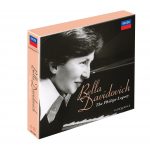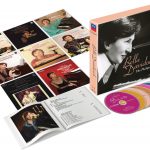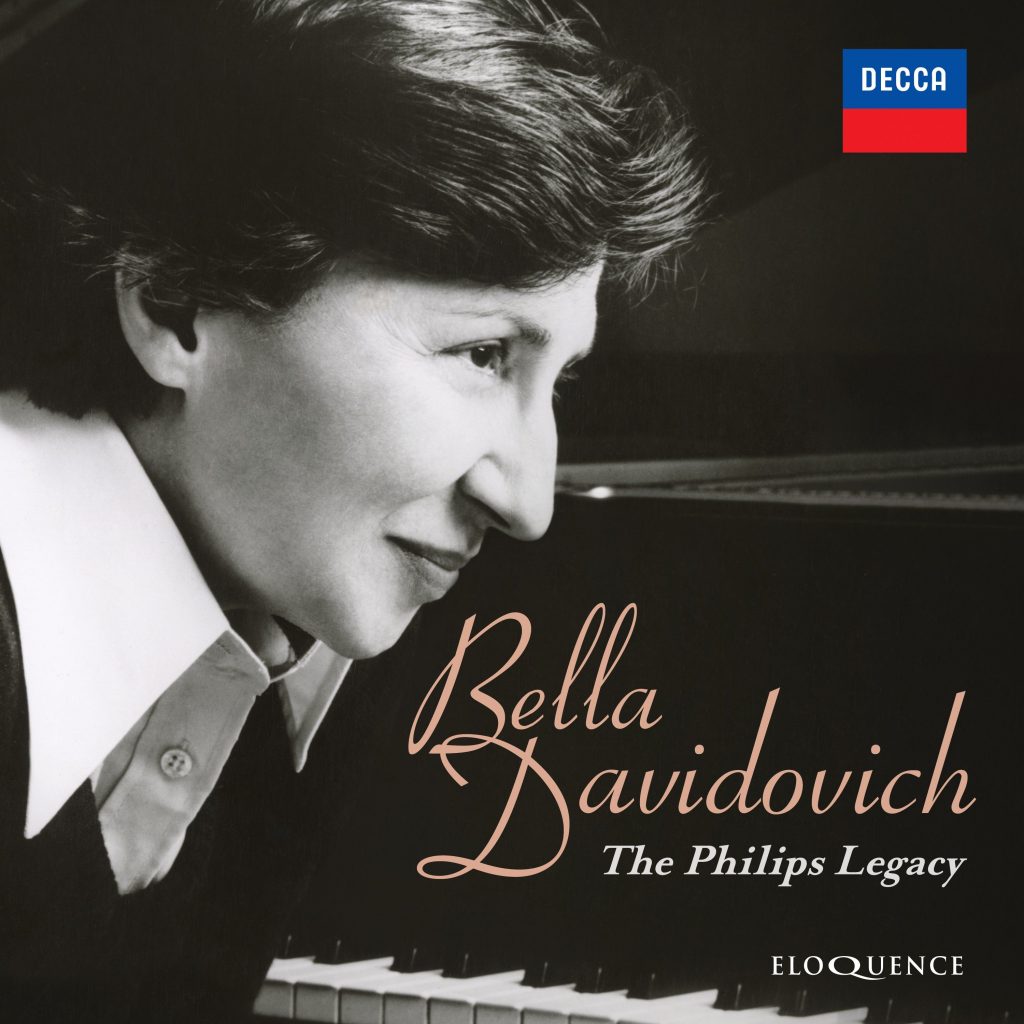
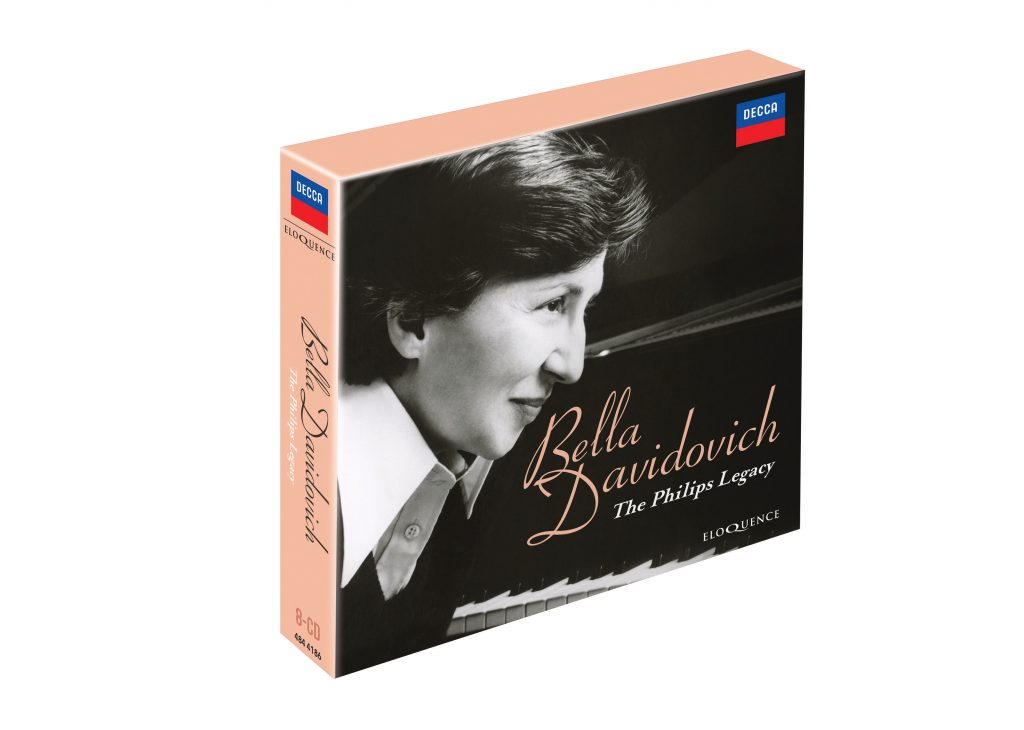
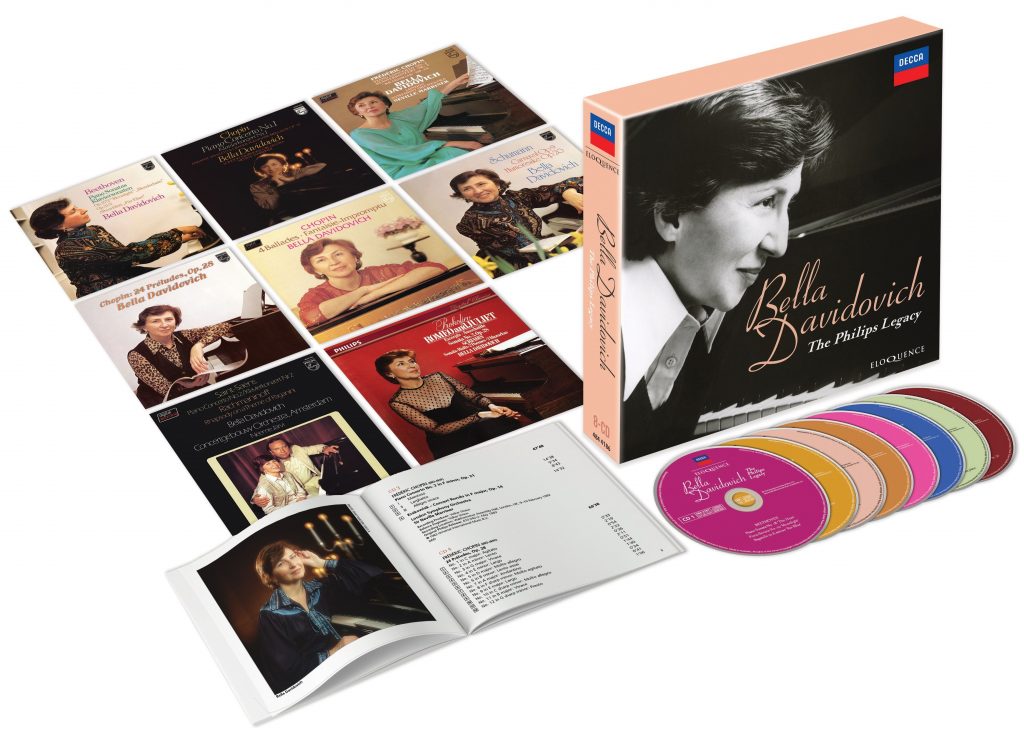
‘Why is everyone writing about me?’ the pianist Lazar Berman once exclaimed. ‘Why don’t you write about Bella Davidovich? She’s more interesting than me. She’s superb!’
Born in 1928 in Baku, the capital of Azerbaijan, the musician acclaimed by Berman as Russia’s ‘greatest female pianist’ shared first prize in the 1949 Chopin Competition at Warsaw with Halina Czerny-Stefanska. Thereafter she was mostly confined to the Soviet Union until she was allowed to emigrate to the US in 1978. When she did so, the intensity of expectation surrounding her arrival and early appearances approached that given to Sviatoslav Richter in the late 1950s. Her debut recital at a sold-out Carnegie Hall evoked an atmosphere usually associated with Horowitz concerts.
‘Russia’s best-kept secret’, shouted the advertisements for her first Philips recordings, but critics were quick to observe that Davidovich did not fit the popular stereotype of the broad-scaled romantic Russian pianist, overpowering the music at every turn. She brought a poetic approach to everything she played, and Philips recorded her in repertoire which played to her strengths, beginning with Swiss sessions in March 1979 of Beethoven sonatas, Schumann’s Carnaval and Chopin’s Preludes. More Chopin followed, including the concertos accompanied by Sir Neville Marriner – and then an album of Rachmaninov and Saint-Saëns at the Concertgebouw, where she had established a warm rapport with both the Dutch orchestra and audience some years before her emigration.
The recordings on this collection date from 1979 to 1983, and Davidovich’s Philips discography came to an end with a recital of Scriabin and Prokofiev (including a superbly pointed selection of pieces from Romeo and Juliet), issued in 1985. Featuring original covers, the set is annotated with a new essay by the piano historian Mark Ainley partly based on conversations with Davidovich’s son, the violinist Dmitri Sitkovetsky.
CD 1
LUDWIG VAN BEETHOVEN (1770–1827)
1–4 Piano Sonata No. 18 in E flat major, Op. 31 No. 3 ‘The Hunt’
5–7 Piano Sonata No. 14 in C sharp minor, Op. 27 No. 2 ‘Moonlight’
8 Bagatelle in A minor, WoO 59 ‘Für Elise’
Bella Davidovich, piano
CD 2
FRÉDÉRIC CHOPIN (1810–1849)
1–3 Piano Concerto No. 1 in E minor, Op. 11
4 Andante spianato et Grande Polonaise brillante in E flat major, Op. 22
Bella Davidovich, piano
London Symphony Orchestra
Neville Marriner
CD 3
FRÉDÉRIC CHOPIN (1810–1849)
1–3 Piano Concerto No. 2 in F minor, Op. 21
4 Krakowiak – Concert Rondo in F major, Op. 14
Bella Davidovich, piano
London Symphony Orchestra
Neville Marriner
CD 4
FRÉDÉRIC CHOPIN (1810–1849)
1–24 24 Préludes, Op. 28
25 Polonaise No. 4 in C minor, Op. 40 No. 2
26 Rondeau in E flat major, Op. 16
27 Barcarolle in F sharp major, Op. 60
Bella Davidovich, piano
CD 5
FRÉDÉRIC CHOPIN (1810–1849)
1 Ballade No. 1 in G minor, Op. 23
2 Ballade No. 2 in F major, Op. 38
3 Ballade No. 3 in A flat major, Op. 47
4 Ballade No. 4 in F minor, Op. 52
5 Impromptu No. 1 in A flat major, Op. 29
6 Impromptu No. 2 in F sharp major, Op. 36
7 Impromptu No. 3 in G flat major, Op. 51
8 Impromptu No. 4 in C sharp minor, Op. 66 ‘Fantaisie-Impromptu’
Bella Davidovich, piano
CD 6
ROBERT SCHUMANN (1810–1856)
1–20 Carnaval, Op. 9
21–26 Humoreske, Op. 20
Bella Davidovich, piano
CD 7
SERGEI RACHMANINOFF (1873–1943)
1–25 Rhapsody on a theme of Paganini, Op. 43
CAMILLE SAINT-SAËNS (1835–1921)
26–28 Piano Concerto No. 2 in G minor, Op. 22
Bella Davidovich, piano
Concertgebouworkest
Neeme Järvi
CD 8
SERGEI PROKOFIEV (1891–1953)
1 Piano Sonata No. 3 in A minor, Op. 28
2–8 Pieces from ‘Romeo and Juliet’, Op. 75
ALEXANDER SCRIABIN (1872–1915)
9–10 Piano Sonata No. 2 in G sharp minor, Op. 19 (Sonata Fantasy)
11–12 Deux Poèmes, Op. 32
13 Mazurka in E minor, Op. 25 No. 3
14–15 Deux Mazurkas, Op. 40
16 Valse in A flat major, Op. 38
Bella Davidovich, piano
CD 1
Recording: 10–16 March 1979
Original Philips Release: 9500 665: 1979
P 1979 Universal International Music B.V.
ADD
CD 2
Recording Producer: Volker Straus
Balance Engineer: Volker Straus
Recording Location: Walthamstow Assembly Hall, London, UK, 24–26 March 1980
Original Philips Release: 9500 889: September 1981
P 1981 Universal International Music B.V.
ADD
CD 3
Recording Producer: Volker Straus
Balance Engineer: Volker Straus
Recording location: Walthamstow Assembly Hall, London, UK, 9–10 February 1982
Original Philips Release: 410 0422: May 1983
P 1983 Universal International Music B.V.
DDD
CD 4
Recording Locations: Musica Théâtre, Salle de Musique, La Chaux-de-Fonds, Switzerland, 10–16 March 1979 (Préludes), February 1985 (Polonaise, Rondeau, Barcarolle)
Original Philips Releases: 9500 666 (Préludes): 1982; 420 3892 (Polonaise, Rondeau, Barcarolle): 1987
P 1979 (Préludes), 1987 (Polonaise, Rondeau, Barcarolle) Universal International Music B.V.
ADD (Préludes) ∙ DDD (Polonaise, Rondeau, Barcarolle)
CD 5
Recording Location: Watford Town Hall, London, UK, February 1981 (Ballades, Fantaisie-Impromptu), December 1982 (Impromptus Nos. 1–3)
Original Philips Release: 6514 099 (Ballades, Fantaisie-Impromptu): 1982; 411 4272 (Impromptus Nos. 1–3): 1984
P 1982 (Ballades, Fantaisie-Impromptu), 1984 (Impromptus Nos. 1–3) Universal International Music B.V.
DDD
CD 6
Recording Location: Musica Théâtre, Salle de Musique, La Chaux-de-Fonds, Switzerland, 10–16 March 1979
Original Philips Release: 9500 667: 1979
P 1979 Universal International Music B.V.
ADD
CD 7
Recording Location: Concertgebouw, Amsterdam, The Netherlands, 1–2 June 1981
Original Philips Release: 6514 164: 1982
P 1982 Universal International Music B.V.
DDD
CD 8
Recording Location: Musica Théâtre, Salle de Musique, Les Chaux-de-Fonds, Switzerland, December 1982 (Prokofiev: Piano Sonata No. 3, Scriabin: Piano Sonata No. 2, Deux Poèmes, 3 Mazurkas, Waltz No. 4), February 1983 (Prokofiev: Romeo and Juliet)
Original Philips Release: 412 7422: 1986
P 1986 Universal International Music B.V.
DDD
“Davidovich manages to give the music a personal warmth and commitment without distorting the musical architecture or meaning. An impressive disc on all counts.” The New York Times (Chopin: Ballades)
“Her records suggest the poised and significant manner of Clara Haskil, but in person she is a much more imperious, colourful and uninhibited sort of player.” The Boston Globe
“Bella Davidovich is an elegant, intimate player… The Humoreske responds exceedingly well to her style of music-making, and her performance is full of sparkle, wit, and a very well-defined sense of line.” Fanfare, July 1980 (Schumann)
“The first movement of the ‘Moonlight’ Sonata is absolutely non-routine; it has an extreme clarity of line and cohesivity of phrasing.” Fanfare, July 1980 (Beethoven)
“Davidovich is one helluva strong player, but she is no show-off; everything is personal, phrased, articulated, sung out, intense, highly poetic. Hers is a superb Carnaval, full of fantasy and poetry.” Stereo Review, October 1980 (Schumann)
“That Davidovich has herself an ample zest for life is evident from the coursing finale of Op.31 No.3. PG Wodehouse’s Aunt Dahlia, doyenne of the Quorn and Pytchley hunts, would have thrilled to so stirring a chase.” Gramophone, February 1981 (Beethoven)
“Unless your entire interest in keyboard playing is acrobatics, I don’t see how you could fail to like Bella Davidovich’s Chopin. The Andante Spianato is gorgeous: pearly and gently sung. The Polonaise is firm, aristocratic, held back until the last possible moment, when the flow simply overtakes you.” Stereo Review, December 1981 (Chopin)
“The big passages erupt with tremendous energy and sweep. Her control (actually it’s a kind of controlled abandon) in the coda of Op. 52 is breathtaking. Exceptional performances.” Fanfare, March 1983 (Chopin: Ballades)
“It is in the ever-popular Rachmaninoff that the Philips team is truly in its element, responding all-out to the work’s passionate, macabre, and capricious elements.” Stereo Review, November 1983 (Rachmaninoff: Paganini Rhapsody)
“Davidovich is one of those pianists who is always tasteful, but in the most interesting manner. In music that encourages many pianists to stretch the concept of interpretation into one of exaggeration, Davidovich remains sane, and even serene.” Fanfare, July 2011 (Chopin)


